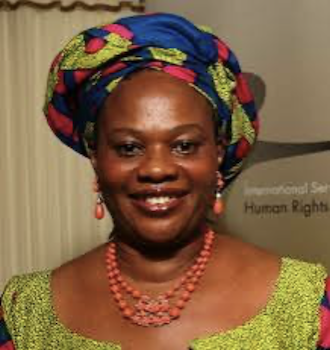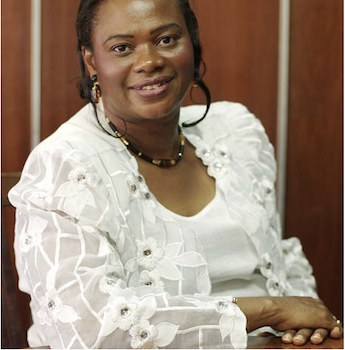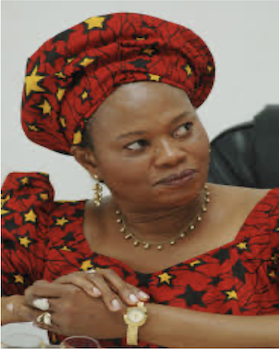
Dora Nkem Akunyili was born on July 14, 1954, to parents Chief and Mrs Paul Young Edemobi in Makurdi, Benue State, Nigeria. Her parents were devout Catholics who raised their six children in the faith. They were very keen on making sure that their children were educated. Taking note of Akunyili's intelligence, she was sent to stay with her maternal uncle in Anambra, where she attended St. Patrick's Primary School, Isuofia in 1966. Her exceptional performance in school was rewarded with a fully funded scholarship to attend Queen of the Rosary secondary school in Enugu State.
During her childhood, Akunyili's performance in secondary school was also exceptional, earning her a Grade 1 distinction in her West African School Certificate (WASC), and she also emerged with the best performance the school had seen, at that time, in 1973. Her academic performance was again rewarded with two scholarships to attend the prestigious University of Nigeria, Nsukka (UNN), one of the only universities in the country at the time. Akunyili chose to study pharmacy, earning her bachelor's degree in 1978. It was in the third year of her studies there when she met her future husband, Dr. John C. Akunyili, a medical student at UNN. With him, Akunyili had six children including Dr. Ijeoma Akunyili, appointed Chief Medical Officer of the Jersey City Medical Center, in the US.
Akunyili undertook graduate courses at the University of London, after which she returned to Nigeria and worked briefly as a pharmacist in the UNN Teaching Hospital. In a bid to further her studies, in 1981, she enrolled for her Doctorate at UNN. At the same time, she was also a graduate assistant, earning a degree in ethnopharmacology in 1985. She continued to teach at the university, becoming a professor in 2000.
Akunyili's first public leadership role would come in 1996, when she served as the zonal officer of the Petroleum Special Trust Fund (PTF). It was during this time that Akunyili was misdiagnosed with pancreatic cancer. She requested funds to enable her to pay for the medical procedure; however, after traveling to the United Kingdom, further tests showed that her illness was wrongly diagnosed. Akunyili, on returning to Nigeria, was given back the money because it was no longer needed, and she donated it. It was this show of honesty that was said to have led to her appointment by the then president, Olusegun Obasanjo, as the Director General (DG) of the National Agency for Food and Drug Administration and Control (NAFDAC), upon her recommendation by the PTF Chief Executive.

Upon accepting the appointment in 2001, Akunyili noted that her main goal was to attack the country's counterfeit food and drug problem. Her main motivation was her sister's death, caused by the counterfeit insulin she took for her diabetes. Akunyili's administration was one of remarkable success, with a major crackdown on the counterfeit food and drug sector. She led both physical and televised campaigns against the counterfeiting issue. Her efforts resulted in numerous attacks on some NAFDAC officers, the burning of branch offices, and numerous death threats against her. This culminated in an actual attempt on her life in 2003. The attack, which left Akunyili shaken but with a stronger resolve, was so popular because the bullet merely grazed her, and ended up stuck in her gele (headscarf). Although six people were arrested and charged with the attempt, in 2016, the charges were dropped.
Her administration also introduced and popularized several initiatives, still in use to date in Nigeria. They included the use of scratch cards on drug packets that consumers could use to verify that the drug was authentic. This initiative was to curb, in particular, the rise in counterfeit malaria and tuberculosis medications which at the time, were among the leading causes of children’s deaths. According to reports, tests conducted on drugs revealed that some of them were no more than syrup and chalk mixed to give the illusion of drugs.
Another initiative was the mandatory registration and inspection of sachet water (more commonly known as pure water in the country) factories to ensure sanitary compliance. Due to her work, the sector was said to have dropped below 20%; it also saw the conclusion of about 45 criminal trials against counterfeiters. In 2005, it was reported that about two billion naira worth of drugs were seized or voluntarily given up by counterfeiters.

Akunyili was also known to mostly hire women because she felt they were less susceptible to bribes, and therefore less likely to be corrupt and receive payments to circumvent investigations and crackdowns. To also encourage sincerity among her staff, she offered incentives such as training abroad and pay raises. This move led to an increase in staff diligence and transparency.
After the expiration of her term as DG of NAFDAC, Akunyili was appointed the Minister of Information and Communications in 2008. However, she retired from the position in 2010 to try her hand in politics. She sought a seat in the National Assembly, as the senator to represent Anambra Central. Running under the umbrella of the All Progressives Grand Alliance (APGA) political party, she lost to the Action Congress of Nigeria (ACN) party's candidate.
Akunyili continued being active, publishing a book titled, The War Against Counterfeit Medicine: My Story in 2010. This book was based on her experience and knowledge of the counterfeit sector. It was revealed in 2014, that she was severely ill with uterine cancer. It was rumored that a misdiagnosis from foreign doctors caused a delay in her treatment. She continued to give speeches and lectures, including one just a few days before her passing. During her lifetime, Akunyili was reported to have won over 930 awards. Among them are the Officer Order of the Niger (OFR), Dr. Kwame Nkrumah Africa Leadership Award, in 2004, the Integrity Award from Transparency International, and the Hero of Time award from SACAIDS. It is claimed that after her death, her husband discovered several boxes with awards stored in them.
Akunyili will always be remembered for her resilience and determination to fight the evil that is counterfeit food and drugs. Her anti-corruption and transparency stance, though not widely appreciated then, came at a time of great need when Nigerians were constantly in fear about the true nature of their food and drugs.
Why Did I Choose to Research Dr. Dora Nkem Akunyili?
When I was a child, I remember always watching and reciting the television jingles encouraging Nigerians not to ingest drugs without a NAFDAC number verified through the scratch cards on the drug packets. This was the same thing with prepackaged food items as well. I decided to research Akunyili because I wanted to know more about the woman who is the reason Nigerians, like myself, are not skeptical about the medication we take. Her work is the reason why Nigerians have a little more confidence in our health sector.
Works Cited
Abiodun, R. (2009, September). Nigeria leads fight against “killer” counterfeit drugs. WHO. Retrieved from https://web.archive.org/web/20120524091753/http://www.who.int/bulletin/volumes/84/9/06-020906/en/
Agbo, N. (2018, August 15). Dora Akunyili: The drug lioness. Guardian News Nigeria. Retrieved from https://guardian.ng/life/dora-akunyili-the-drug-lioness/
Encyclopedia.com. Akunyili, Dora. Retrieved from https://www.encyclopedia.com/education/news-wires-white-papers-and-books/akunyili-dora
Frenkiel, O. (2005, July 12). One woman's war with fake drugs. BBC. Retrieved from http://news.bbc.co.uk/2/hi/programmes/this_world/4656627.stm
NAFDAC Nigeria (2005, November 23). Prof. Dora Nkem Akunyili, OFR biography. Retrieved from https://web.archive.org/web/20070630231848/http://www.nafdacnigeria.or
Ogundipe, S., Agande, B., Obinna, C., Ojeme, V., Edike, T., Olatunji, D., Erunke, J., & Agakwuru, J. ( 2014, June 8). How misdiagnosis killed Akunyili. Vanguard News. Retrieved from https://www.vanguardngr.com/2014/06/misdiagnosis-killed-akunyili/
This article was published on 10/14/24